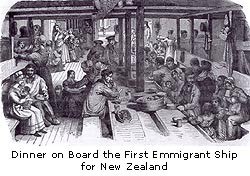Section 2: The arrival of the Pakeha to New Zealand
Since the beginning of time, people have explored the world.
About 200 years ago, people from Britain, Europe, and America were exploring the world to find new land to live on. The governments of these countries wanted to own more land and have more power in the world, and they wanted to find new people to trade with. When people from these countries went to a new land they wanted to change it to make it like the place they had come from.

Some British explorers came to Aotearoa, the land of te iwi Māori. They went back to Britain and told the British Government that this country would be a good place for British people to live. There were at first many sealers, whalers, missionaries, farmers, and traders. A few people were also arriving from France and America. Later, the British Government encouraged British families to come here. The British Government thought that Aotearoa would be a good base in the Pacific for Britain.
Many British families packed their bags and boarded ships to start a new life in a land they had never seen on the other side of the world. It took about six months to sail from Britain to Aotearoa and the voyage was often cold and uncomfortable.
Adults and children sometimes died in the cramped conditions of the sailing ships before they reached the shores of their new home. But they kept coming because they wanted a better life than they had in Britain. Many of them had been very poor and hungry in Britain.
Contact between Māori and non-Māori people
At first, there were many more Māori than non-Māori people in Aotearoa. Some good trading relationships developed. But it was a time of great change and confusion for everyone. There were new languages and behaviours to understand, and new technology.
In the 1820s and 1830s, more settlers arrived and there were arguments and misunder-standings between Māori and settlers. This was because, while Māori had laws and rules for Aotearoa, some settlers wrongly thought that there was no law here. Some settlers knew there were Māori laws but chose to disobey these laws. When a settler's cows trampled over Māori neigh-bours' precious food crops, what could Māori do? Also, Māori were arguing and fighting with each other, sometimes about whether or not they should let the settlers have some of their land. And Europeans were fighting with other Europeans over land.
The British Government decided to send someone to work out a solution to the problems. In 1833 they sent James Busby.
The First Contract
In 1835, Busby arranged a meeting for 34 northern rangatira to sign a declaration, the Declaration of Independence. The declaration said that:
- iwi would remain in charge of their land and all the people that lived there; and
- Britain would protect them from other countries that might try to take them over.
The rangatira chose a flag which represented Aotearoa.
After the signing in the north, the declaration was taken around the North Island. It was signed by Potatau Te Wherowhero, a Waikato rangatira who later became the Māori King. Te Hapuku of Ngati Kahungunu, who had been known to have a low opinion of Europeans, also signed it. The rangatira decided to meet at Waitangi every year to make the laws and rules for acceptable behaviour for all people living in Aotearoa, and for trading. But these meetings did not come about, perhaps because the rangatira were too busy with other matters.
Buying and 'Owning' Land
In 1838, a group from Britain called the New Zealand Company began buying land from iwi to sell to settlers whom they brought to New Zealand. They did this to make money. Other settlers were buying and selling land to make money as well.
The idea of buying land was something new to Māori. The British settlers thought that they owned the land after they bought it from Māori. Some Māori thought that they were letting the settlers live on and use the land but thought it would always be Māori land. Hapu and iwi believe that a person can never be permanently separated from the land they were born on. Other people may use it, but other people would never be tangata whenua. The different ideas held by British and Māori about owning land were the cause of many problems.
Land Sales Out of Control
Busby could see that the New Zealand Company might buy far too much Māori land but he had no means to stop it. Māori were in danger of losing too much of their land to the New Zealand Company and other settlers. Busby told the British Government about the land sales and about all the fighting as well.
The British Government wanted to ask the different iwi if they would agree to Britain making the laws about behaviour for New Zealand and making sure everybody obeyed them. They sent Captain William Hobson to New Zealand as a governor to ask Māori rangatira if their iwi agreed to the idea.
The Arrival of Pakeha: Questions and Activities
This page was last updated: